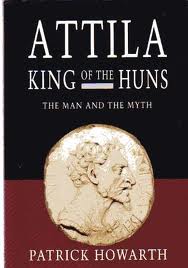 I had hoped that this book would be something like Genghis Khan and the Making of the Modern World, but alas and alack, this was not to be the case. Where the book on the Mongols was dymanic and narrative, this book was rather academic and stretched out what little we know about Attila the Hun, mostly anecdotal, into chapters.
I had hoped that this book would be something like Genghis Khan and the Making of the Modern World, but alas and alack, this was not to be the case. Where the book on the Mongols was dymanic and narrative, this book was rather academic and stretched out what little we know about Attila the Hun, mostly anecdotal, into chapters.
Attila the Hun ruled the Huns for eight years, which means basically eight campaigns (although he shared rule with a brother for some time before that). Since he ruled in the 5th century, in the Dark Ages, in an illiterate tribe, there are no Hun records themselves, and all accounts–such as those spare ones are–come from exterior sources. So the elements of the book that are about Attila are sparse anecdotes stretched into chapters. Kind of like how this report is stretched by repeating itself.
The author throws in a goodly number of name-checks of the other rulers of the era, which is after the split of the Roman Empire and before the final collapse of the Western Empire, so you get a summary history of the era, but the book lacks flavor.
I dunno; this book is subtitled The Man and the Myth, and I get the sense that Attila really punches above his weight in historic notoriety based on a couple things: he came along at a time when both remnants of the Roman Empire were weakening, the papacy was strengthening, and they needed a scapegoat or common enemy. He appears more in fictional accounts of his life or other lives than in actual history accounts, for hundreds of years after his death. Face it, he was the early middle ages equivalent of Hitler: if you needed someone in your opera who was archetypically evil, you threw in Attila. For millenia. Why, George Patton called the Germans Huns in the 20th century. If we didn’t have Hitler and Nazis these days, movies would have asiatic horsemen detonating nukes at the Super Bowl.
I mean, he couldn’t conquer France for crying out loud. A couple kickball teams allied together could conquer France, and I don’t mean the children’s gym class kickball teams; I mean the real sissies: the adult kickball league kickball teams.
It’s a pretty short book (187 pages of text), though, and it is a good primer on fifth century southern Europe. And, apparently, it gives one enough confidence to spout off on the relative weight of the Hunnic “Empire.” I mean, with an Empire, you sort of expect that it will last over a couple decades and maybe a couple generations of successful leaders.
And I did get two blog posts from it: this one, and Management Lessons from Attila the Hun.


